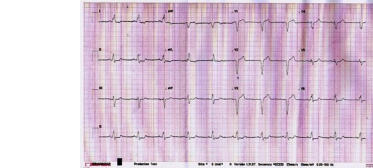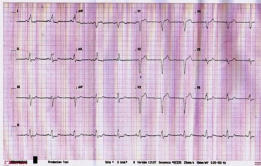



An
electrocardiogram
(
ECG
or
EKG
)
is
a
simple,
noninvasive,
painless
test
that
records
the
heart's
electrical
activity
over
a period of time using electrodes placed on a patient's body.
Your doctor may recommend an EKG if you’re experiencing symptoms or signs that may suggest a heart problem, including:
pain in your chest
trouble breathing
feeling tired or weak
pounding, racing or fluttering of your heart
a feeling that your heart is beating unevenly
detection of unusual sounds when your doctor listens to your heart
If
you
have
a
family
history
of
heart
disease,
your
doctor
may
suggest
an
electrocardiogram
as
an
early
screening
test,
even
if
you
have
no
symptoms.
EKG
leads
are
attached
to
the
body
while
the
patient
lies
flat
on
a
bed
or
table.
Make
sure
to
lie
as
still
as
possible
and
breathe
normally.
You
shouldn’t
talk
during
the
test.
The
test
takes
about
five
minutes.
In
some
instances,
men
may
require
the
shaving
of
a
small
amount
of
chest hair to obtain optimal contact between the leads and the skin.
Sometimes
EKG
abnormalities
can
be
seen
only
during
exercise
or
while
symptoms
are
present.
To
check
for
these
changes
in
the
heartbeat,
a
stress
EKG
may
be
done,
and
you
will
be
asked
to
walk
or
run
on
a
treadmill
or
cycle
on
an
exercise
bike
while
your
heartbeat
is recorded.
No
special
preparations
are
necessary.
However,
tell
your
doctor
about
any
medications
or
supplements
you're
taking.
Some
medications
and supplements may affect the outcome of your electrocardiogram.
If you would like additional information regarding our services or to request an appointment, you can contact us by phone
(952 80 53 68) or by
email
.







© 2023 - Centro Medicina Natural y Antienvejecimiento - Neural therapy, Homeopathy, Ozone therapy, Carboxytherapy, Mesotherapy
Avda. Juan Carlos I, nº 29, portal 5, 2ºB -- 29680, Estepona (Málaga)



© 2023 - Centro Medicina Natural y Antienvejecimiento
Tel: 952 80 53 68
E-mail: info@medicinabiologica.es

An
electrocardiogram
(
ECG
or
EKG
)
is
a
simple,
noninvasive,
painless
test
that
records
the
heart's
electrical
activity
over
a
period
of
time
using
electrodes placed on a patient's body.
Your
doctor
may
recommend
an
EKG
if
you’re
experiencing
symptoms
or signs that may suggest a heart problem, including:
pain in your chest
trouble breathing
feeling tired or weak
pounding, racing or fluttering of your heart
a feeling that your heart is beating unevenly
detection
of
unusual
sounds
when
your
doctor
listens
to
your heart
If
you
have
a
family
history
of
heart
disease,
your
doctor
may
suggest
an
electrocardiogram
as
an
early
screening
test,
even
if
you
have
no
symptoms.
EKG
leads
are
attached
to
the
body
while
the
patient
lies
flat
on
a
bed
or
table.
Make
sure
to
lie
as
still
as
possible
and
breathe
normally.
You
shouldn’t
talk
during
the
test.
The
test
takes
about
five
minutes.
In
some
instances,
men
may
require
the
shaving
of
a
small
amount
of
chest hair to obtain optimal contact between the leads and the skin.
Sometimes
EKG
abnormalities
can
be
seen
only
during
exercise
or
while
symptoms
are
present.
To
check
for
these
changes
in
the
heartbeat,
a
stress
EKG
may
be
done,
and
you
will
be
asked
to
walk
or
run
on
a
treadmill
or
cycle
on
an
exercise
bike
while
your
heartbeat
is recorded.
No
special
preparations
are
necessary.
However,
tell
your
doctor
about
any
medications
or
supplements
you're
taking.
Some
medications
and
supplements
may
affect
the
outcome
of
your
electrocardiogram.
If
you
would
like
additional
information
regarding
our
services
or to request an appointment, you can contact us by phone
(952 80 53 68) or by
email
.

























